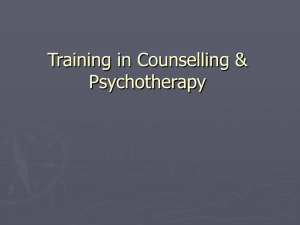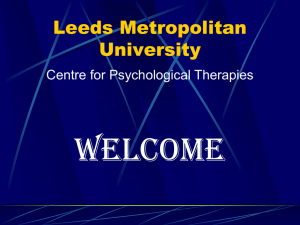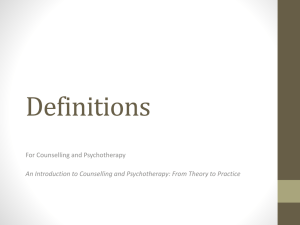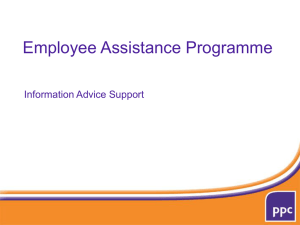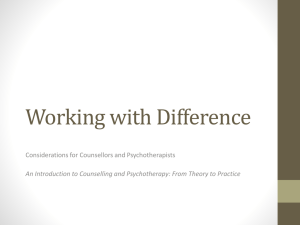Statutory Regulation of Counselling and Counsellor Mobility in
advertisement
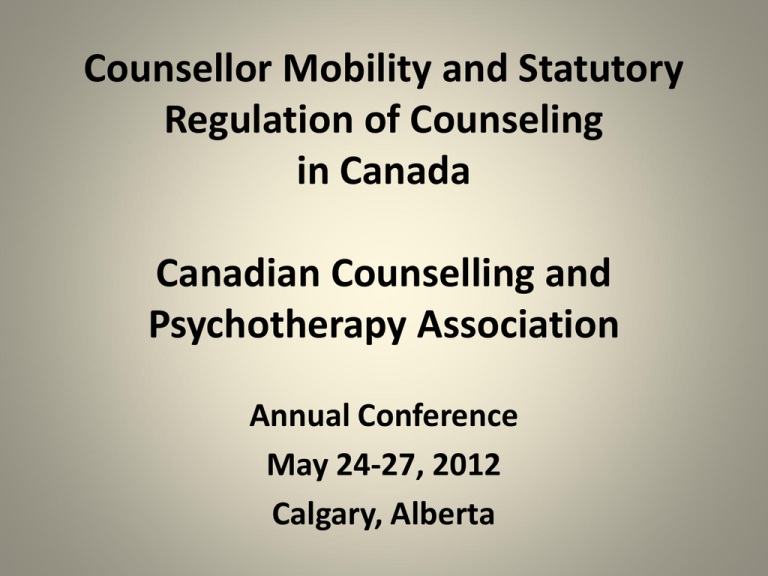
Counsellor Mobility and Statutory Regulation of Counseling in Canada Canadian Counselling and Psychotherapy Association Annual Conference May 24-27, 2012 Calgary, Alberta CO-CHAIRS Dr. Blythe Shepard Dr. Glenn Sheppard PANELISTS Barbara MacCallum John Driscoll/Marian McDonald Serge Hall Lorna Martin Duncan Shields NOVA SCOTIA Bill 201 - An Act Respecting the Practice of Counselling Therapists (2008) (title protection) Act Proclamation, October, 2011 Professional Title: Counselling Therapists Nova Scotia College of Counselling Therapists Nova Scotia Association of Counselling Therapists (first affiliate of CCPA) Licensing Requirements: Masters Degree and 2000 hours of supervised clinical practice ONTARIO Ontario Coalition of Mental Health Professionals (13 associations represented) Bill 171 Psychotherapy and Registered Mental Health Therapists Act, 2007, Schedule Q of the Regulated Health Professionals Act (RHPA) Professional Titles: - Psychotherapists (title protection & controlled Act) - Registered Mental Health Therapists (title protection) Transitional Council of the College of Psychotherapists and Registered Mental Health Therapists of Ontario NEW BRUNSWICK New Brunswick Federation (3 provincial associations) (AFCONB, NBACT and NBPCA) Draft legislation for statutory regulation of Counselling Therapists now ready…optimistically in final stage of success Licensing Requirement: Masters Degree QUEBEC Statutory regulation of counsellors for 40+ years • Title Protection Regulation 1969; Amendments 1973, 2004 • Practice Protection Regulation 2009 • Psychotherapy Act 2012: Expected enforcement June 2012 Professional Titles: • Conseiller/ conseillère d’orientation (c.o.) • Conseiller/conseillère d’orientation professionnelle (c.o.p.) • Orienteur • Orienteur professionnel • Guidance counsellor (g.c.) • Vocational guidance counsellor (v.c.g.) • Psychotherapist / Psychothérapeute QUEBEC (cont’d.) Regulatory Ordres There are seven regulatory ordres in Quebec that relate to the practice of counselling and psychotherapy: • • • • • • • Ordre des conseillers et conseillères d’orientation du Québec Ordre des psychoéducateurs et psychoéducatrices du Québec Ordre des travailleurs sociaux et des théraeutes conjugaux et familiaux du Québec Ordre des infirmières et infirmiers du Québec Ordre des ergothérapeutes du Québec Ordre des psychologues du Québec Collège des médecin du Québec QUEBEC (cont’d.) Protected activities: psychotherapy (permit required – administered through the Ordre des Psychologues) Minimum Educational Entry Requirement: Master’s Degree (Act has Grandparenting provision) QUEBEC AND ONTARIO Psychotherapy Acts in Quebec and Ontario permit members of the following professions to obtain a license to practice psychotherapy: • Psychologists • Nurses • Occupational Therapists • Physicians Psychoeducators and Career/Guidance Counsellors in Quebec Registered Mental Health Therapist in Ontario (unclear from Act) DEFINITIONS OF PSYCHOTHERAPY IN QUEBEC AND ONTARIO ACTS QUEBEC “Psychotherapy is a psychological treatment for a mental disorder, behavioural disturbances or any other problem causing psychological suffering or distress.” “The purpose of psychotherapy is to elicit in the client, significant changes in his cognitive, emotional, behavioural functioning, his interpersonal system, his personality, and his state of health. This is a process reaching beyond help in confronting common problems, counselling or support relations.” DEFINITIONS OF PSYCHOTHERAPY IN QUEBEC AND ONTARIO ACTS ONTARIO “Under the new Act, the scope of practice of psychotherapy is the assessment and treatment of cognitive, emotional or behavioural disturbances by psychotherapeutic means, delivered through a therapeutic based primarily on verbal or nonverbal communication.” A CONTROLLED ACT (Ontario Act) “The new Act also authorizes members of the College to perform a new controlled act (an activity that when performed by an unqualified practitioner may put the public at substantial risk and are therefore “controlled” for use by legislation) of treatment by means of psychotherapy technique delivered through a therapeutic relationship, an individual’s serious disorder of thought, cognition, mood, emotional regulation, perception or memory that may seriously impair the individual’s judgement, insight, behaviour, communication or social functioning.” BRITISH COLUMBIA The Task Group for Counsellor Regulation (established 1995, 7 associations represented) • The American Association of Pastoral Counsellors (BC Chapter) • The BC Art Therapy Association • The BC Association for Marriage and Family Therapy • The BC Association of Clinical Counsellors • The Canadian Association for Pastoral Practice and Education (BC Chapter) • The Canadian Counselling and Psychotherapy Association (BC Chapter) • The Music Therapy Association of BC BRITISH COLUMBIA National Entry-to-Practice Competency Profile for Counselling Therapists Professional Title: Counselling Therapists The Task Group for Counsellor Regulation met on March 2nd, 2012 and confirmed that the financial dimensions, the policies, the governance model, and the core procedures (including a complete competency profile) are all in place for a statutory college under the Health Professions Act in BC AGREEMENT ON INTERNAL TRADE (AIT) CHAPTER 7 (LABOUR MOBILITY To eliminate/reduce obstacles to labour mobility in Canada To enable any worker certified/licenced/registered for an occupation (profession or trade) in one province or territory to be accepted for certified/licensed/registered for that occupation by any other province or territory to which they might move NEW AIT REQUIREMENTS P/Ts agree to certify workers already certified by other P/Ts without additional material training, experience, examinations or assessment requirements P/Ts may impose certain requirements, as a condition of certification, and, in specific circumstances, may refuse to certify or impose certification restrictions/ limitations/conditions Maintenance of additional material requirements is permissible but must: • be clearly justified as necessary to achieve a legitimate objective, such as public safety or consumer protection • be approved by the government maintaining them and posted to the public CIT website Greater emphasis on the adoption of common interprovincial/territorial standards, where possible and practical DEVELOPMENT OF NEW OCCUPATIONAL STANDARDS AND CHANGES TO EXISTING STANDARDS If occupational standards do not exist in the territories of any of the Parties in respect of an occupation and a Party considers it necessary to establish occupational standards for that occupation, the Parties agree that the process of development of new occupational standards should occur in a manner that will facilitate future reconciliation and avoid the creation of new barriers to mobility. A Party intending to develop new standards shall notify the other Parties of its intent and afford them an opportunity to participate in the development of those standards. DEVELOPMENT OF NEW OCCUPATIONAL STANDARDS AND CHANGES TO EXISTING STANDARDS (cont’d.) If a Party considers it necessary to make changes to existing standards in respect of an occupation, the Parties agree that the process for making such changes should occur in a manner that will foster reconciliation and avoid the creation of new barriers to mobility. A Party intending to make such changes shall notify the other Parties and afford them an opportunity to participate in the modification of those standards. (AIT, pp. 102-103). OVERVIEW OF SYMPOSIA 2006-2011 SYMPOSIA 2006: Symposium on the Statutory Regulation of Counselling, Vancouver, B.C. Sponsored by British Columbia Association of Clinical Counsellors (BCACC) and the Canadian Counselling Association 2008: National Symposium on Interprovincial Mobility within the Counselling Profession, Ottawa SYMPOSIA (cont’d.) 2009: National Symposium on Interprovincial/Territorial Mobility within the Counselling Profession, Ottawa. Both sponsored by the Canadian Counselling Association with funding from the Human Resources Skills Development Canada (HRSDC) SYMPOSIUM 2011 Sharing Research & Development of Generic Support Materials Purpose Share and confirm findings of survey of members of the profession re: titles, definition, and generic scope of practice. Provide core set of materials that increase mobility of labour across Canada by simplifying and streamlining the regulatory process. Consult re: national framework for code of ethics/standards of practice. 2011 SURVEY RESULTS WHY DO A SURVEY? To determine levels of agreement in Canada for a definition of counselling and psychotherapy, and a scope of practice statement for counselling and psychotherapy practitioners and organizations. To determine equivalencies between provincial and territorial scopes and definitions to national definitions. When this equivalency is achieved, labour mobility is enhanced. Validating equivalent definitions and scopes results in acknowledgement of a single profession. Core of the survey: “Do these statements describe you and your organization?” WHAT WAS PRESENTED? DEFINITION OF COUNSELLING Counselling is a relational process based upon the ethical use of specific professional competencies to facilitate human change. Counselling addresses wellness, relationships, personal growth, career development, mental health, and psychological illness or distress. The counselling process is characterized by the application of recognized cognitive, affective, expressive, somatic, spiritual, developmental, behavioural, learning, and systemic principles WHAT WAS PRESENTED? (cont’d.) SCOPE OF PRACTICE The counselling profession: • is attentive to and responds to diversity and inclusiveness; • works in the best interest of individuals, couples, families, groups organizations, communities, and the public-at-large; • works in the domains of cognition, emotion, expression, somatics, human development, behaviour, learning, and interactive systems; WHAT WAS PRESENTED? (cont’d.) SCOPE OF PRACTICE The counselling profession: • promotes mental health by developing and enhancing: personal, relational, sexual, career, and spiritual growth and well-being, personal awareness and resources, decision-making and problem-solving; • remediates or provides treatment for disorders in cognitive, behavioural, interpersonal, and emotional functioning; WHAT WAS PRESENTED? (cont’d.) SCOPE OF PRACTICE The counselling profession: • applies specific and recognized evaluation and assessment methods; • may also include supervision, education, training, consultation, research, diagnosis, and referral. SURVEY RESULTS Titles, Definitions & Scope of Practice DEMOGRAPHIC FINDINGS 46 organizations and 1,146 individuals responded to the survey. 25.8% of respondents had been in practice 5 years or less; 15.5% for more than 20 years. 595 (42.0%) respondents were in private practice; 397 (28.0%) worked in schools and universities; agencies and health care settings accounted for most of the rest. RESULTS Definition of Counselling and Scope of Practice The survey provided respondents with a research-based definition of counselling and scope of practice. In both the definition and the scope of practice sections of the survey, responses showed consistently over 93% agreement, and always less than 4% disagreement. This is a remarkable expression of near-consensus, demonstrating that while our places of work, job titles, ages, modalities, and client bases show an amazing diversity, we have a rock-solid core identity as a profession

